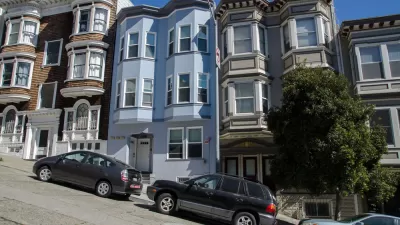A new law in Portland, Maine could be the first to charge an affordable housing fee from new hotel developments.

"The Portland City Council voted unanimously Wednesday to require hotel developers either to build low-income housing, or pay a fee to the city," report Randy Billings.
"Under the new rules, hotel developers will have to build one low-income rental unit for every 28 hotel units they produce," according to Billings. "If developers don’t want to build the units, they will have to pay a $3,806 per unit fee to the city’s housing trust fund, which is used to encourage the development of low-income housing."
The new law follows a city-commissioned study finding that "hotels rely on low-wage workers who can’t afford to live near their jobs."
The article cites Portland Planning and Urban Development Director Jeff Levine, who speculates that the city could be the first in the nation to charge an affordable housing fee of hotel developments. Portland in 2015 adopted an inclusionary zoning requirement for new housing developments larger than ten units.
For more insight and commentary on Portland's new affordable housing fee for hotel developments, see also an article by Jared Brey.
FULL STORY: Portland council decides hotel developers will help fund affordable housing

Alabama: Trump Terminates Settlements for Black Communities Harmed By Raw Sewage
Trump deemed the landmark civil rights agreement “illegal DEI and environmental justice policy.”

Study: Maui’s Plan to Convert Vacation Rentals to Long-Term Housing Could Cause Nearly $1 Billion Economic Loss
The plan would reduce visitor accommodation by 25% resulting in 1,900 jobs lost.

Why Should We Subsidize Public Transportation?
Many public transit agencies face financial stress due to rising costs, declining fare revenue, and declining subsidies. Transit advocates must provide a strong business case for increasing public transit funding.

Paris Bike Boom Leads to Steep Drop in Air Pollution
The French city’s air quality has improved dramatically in the past 20 years, coinciding with a growth in cycling.

Why Housing Costs More to Build in California Than in Texas
Hard costs like labor and materials combined with ‘soft’ costs such as permitting make building in the San Francisco Bay Area almost three times as costly as in Texas cities.

San Diego County Sees a Rise in Urban Coyotes
San Diego County experiences a rise in urban coyotes, as sightings become prevalent throughout its urban neighbourhoods and surrounding areas.
Urban Design for Planners 1: Software Tools
This six-course series explores essential urban design concepts using open source software and equips planners with the tools they need to participate fully in the urban design process.
Planning for Universal Design
Learn the tools for implementing Universal Design in planning regulations.
Smith Gee Studio
Alamo Area Metropolitan Planning Organization
City of Santa Clarita
Institute for Housing and Urban Development Studies (IHS)
City of Grandview
Harvard GSD Executive Education
Toledo-Lucas County Plan Commissions
Salt Lake City
NYU Wagner Graduate School of Public Service





























